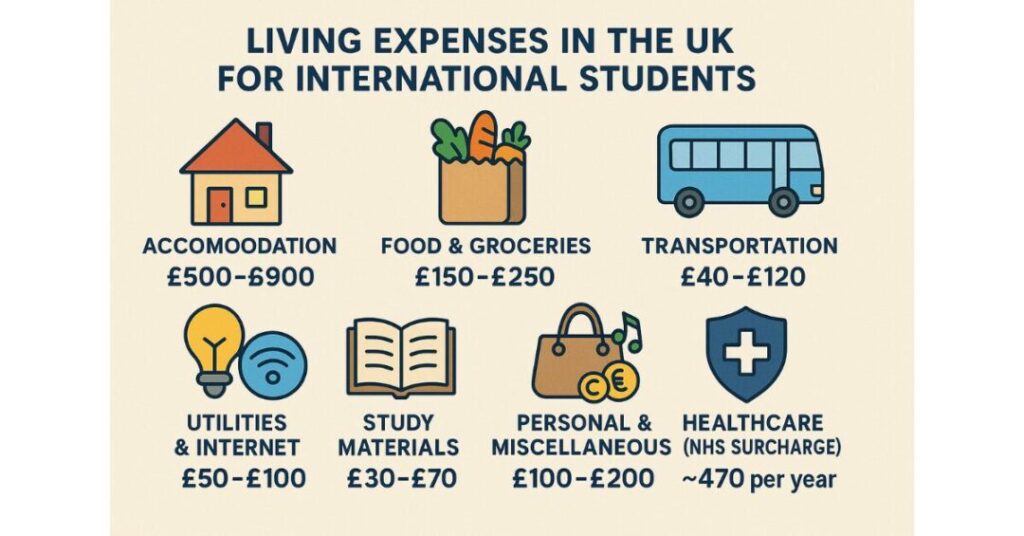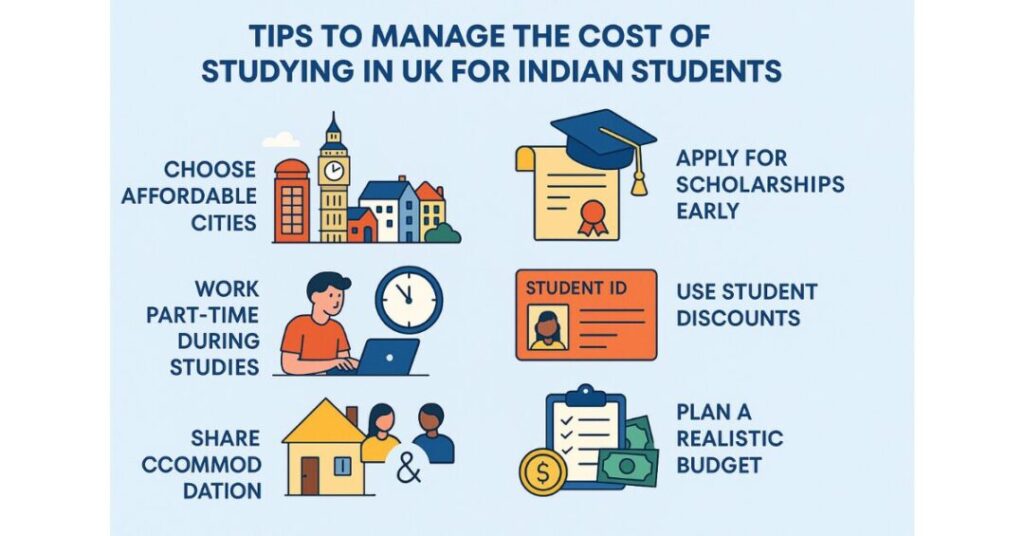15 September 2025
6 minutes read
Cost of Studying in UK for Indian Students

Key Takeaways
- Cost of studying in UK for Indian students ranges between £22,000–£30,000 per year, including tuition fees and living costs.
- Students can manage expenses through scholarships, part-time work (20 hours per week), and careful budgeting.
- The UK offers shorter degree programs and global exposure, making it a strong value-for-money study destination.
Did you know that the average cost of living in the UK for Indian students in 2023 may cost anywhere between £12,000–£15,000 a year? Many students aspiring to study abroad often underestimate these expenses, only to face financial stress once they start living in the UK.
Studying in top universities in the UK, like Oxford, Cambridge, or Imperial, sounds like a dream, but the cost of studying and living can feel overwhelming. But don’t worry, understanding the real numbers, from UK student visa charges to everyday living costs, helps you plan smartly. This article breaks it down so you can live and study in UK confidently without constant money worries.
How much does it cost to study in the UK?
The cost of studying in the UK for Indian students can vary depending on the course of study, university, and city. Tuition fees in the UK cost around £11,000–£40,000 per year, with leading universities like the University of Oxford, University of Cambridge, and Imperial College London on the higher side.
Living costs in the UK may add £12,000–£15,000 annually. Including application fee, visa to study, and other expenses, the study in UK cost averages £22,000–£30,000 yearly.
Average tuition fees in Top UK Universities
For many students in the UK, tuition fees make up the biggest part of the overall budget. The cost of studying in UK for Indian students depends on the university, study level, and course of study.
While fees for UK programs vary widely, leading universities in the UK often charge higher amounts, making it essential for international students to plan their stay in the UK carefully. Here’s a breakdown of the average tuition fees for top UK universities for international students:
| University | Average Tuition Fees (per year) | Notes for Indian Students |
|---|---|---|
| University of Oxford | £25,000 – £45,000 | Fees vary depending on study level and courses in the UK; scholarships in the UK available for Indian students. |
| University of Cambridge | £24,000 – £42,000 | Cost in the UK can be expensive, but many UK universities offer scholarships for international students in the UK. |
| Imperial College London | £28,000 – £40,000 | Popular study destination for Indian students studying engineering, science, and business programs in the UK. |
| London School of Economics (LSE) | £23,000 – £36,000 | Ideal for students seeking a degree in the UK in social sciences; fees and living expenses in London are higher. |
| University of Edinburgh | £22,000 – £35,000 | Studying in the UK varies by city; Edinburgh offers relatively good value compared to London. |
| King’s College London | £22,000 – £38,000 | Indian students in the UK may cost around £30,000–£40,000 including living costs in the UK. |
Living Expenses in the UK for International Students
For any student in the UK, tuition fees are just one part of the total budget. The cost of studying in UK for Indian students also includes day-to-day living costs, which can be high depending on the city.

While studying in the UK varies by location, students planning their stay in the UK should be aware of expenses like rent, food, travel, and healthcare to manage their finances better. Here’s a table showing the average living expenses in the UK for international students:
| Expense Category | Average Monthly Cost | Notes for Indian Students |
|---|---|---|
| Accommodation (Rent) | £500 – £900 | Costs vary by city; London is more expensive compared to the rest of the UK. |
| Food & Groceries | £150 – £250 | Students studying in the UK can save by cooking at home; eating out often is expensive for Indian students. |
| Transportation | £40 – £120 | Cities of the UK offer student discounts on travel passes; walking/cycling reduces costs. |
| Utilities & Internet | £50 – £100 | Some student accommodations include bills; check before signing contracts. |
| Study Materials | £30 – £70 | Course of study and study level can impact costs for books and lab equipment. |
| Personal & Miscellaneous | £100 – £200 | Covers clothing, leisure, and unexpected expenses during stay in the UK. |
| Healthcare (NHS Surcharge) | ~£470 per year | Paid with UK visas and immigration application fee for international students. |
Scholarships and Financial Aid for Indian Students
For many Indian students in the UK, tuition fees and the cost of living in UK can feel overwhelming. The good news is that several scholarships in the UK and financial aid options are available for international students in the UK, making this dream study destination more affordable.
Whether you wish to study at leading universities in the UK or plan your stay in the UK for a specific degree in the UK, scholarships help reduce the overall cost of studying in UK for Indian students. Here are some popular scholarships available for Indian students:
| Scholarship | Offered By | Coverage/Benefit | Notes for Indian Students |
|---|---|---|---|
| Chevening Scholarships | UK Government | Full tuition fees + living costs | Available for Indian students applying from outside the UK; highly competitive. |
| Commonwealth Scholarships | Commonwealth & UK Government | Tuition fees in the UK, travel, and living expenses | Best for students seeking higher education in the UK in specific fields. |
| GREAT Scholarships | British Council & UK Universities | £10,000 towards tuition fees | Available in many UK universities; ideal for Indian students studying Master’s programs. |
| Rhodes Scholarships | University of Oxford | Full tuition + fees and living expenses | Dream of studying at Oxford? This covers almost all costs. |
| Gates Cambridge Scholarship | University of Cambridge | Full tuition fees, UK cost and living expenses amount | For exceptional students planning postgraduate courses in the UK. |
| University-specific Scholarships | Many UK universities offer | Partial fee waivers or stipends | Fees for UK courses vary; scholarships available for international students at study level UG/PG. |
Part-Time Jobs and Earning Opportunities
Balancing the cost of studying in UK for Indian students often requires looking beyond scholarships and savings. One of the most practical ways to manage expenses is through part-time jobs, as international students have access to work opportunities while pursuing their degree. Most students want to study while earning, and UK student visa rules allow up to 20 hours per week during term time and full-time in the UK during holidays.
There are plenty of job in the UK options for international students to stay financially stable, ranging from retail and hospitality roles to research assistant positions at universities in the UK. While pay rates can vary depending on cities and industries, part-time work in the UK is good value for students planning long-term. With the right balance between academics and work, these opportunities not only cover student needs but also provide valuable experience connecting India and the UK.
Cost of Studying in UK vs. Other Countries
The cost of studying in UK for Indian students can feel high, but it’s important to compare it with other popular study destinations. While UK courses vary depending on the study level and field, the overall expenses in the UK can sometimes be lower due to shorter course durations.
Unlike some countries where costs stretch over multiple years, universities in the UK offer intensive programs that help reduce total expenses. Here’s a comparison of costs across study destinations:
| Country | Average Annual Tuition Fees | Average Living Costs | Key Insight |
|---|---|---|---|
| United Kingdom | £11,000 – £40,000 | £12,000 – £15,000 | Cost can vary depending on course; shorter degree programs in the UK are good value. |
| United States | $20,000 – $50,000 | $15,000 – $20,000 | Longer courses increase overall cost despite scholarships available in the US. |
| Canada | CAD 15,000 – 35,000 | CAD 10,000 – 15,000 | Affordable tuition, but visa rules may be stricter than options available in the UK. |
| Australia | AUD 20,000 – 45,000 | AUD 12,000 – 18,000 | Popular choice, but expenses can be similar to the UK depending on the city. |
| Germany | €0 – €10,000 | €8,000 – €12,000 | Public universities offer low tuition, but living costs and language requirements matter. |
Tips to Manage the Cost of Studying in UK for Indian Students
Managing the cost of studying in UK for Indian students can feel overwhelming, especially since expenses in the UK can vary depending on your city, course, and lifestyle choices.

With smart planning and practical strategies, international students can ease financial pressure and focus more on their studies. Here are some tips for international students:
- Choose Affordable Cities
Living costs in London are higher, but smaller cities in the UK can vary depending on location and offer lower rent and travel expenses. - Apply for Scholarships Early
Many scholarships are available for Indian students; applying early improves your chances of reducing tuition and living costs. - Work Part-Time During Studies
International students can work up to 20 hours per week, which helps cover personal expenses without disrupting studies. - Use Student Discounts
From travel to food, tips for international students include using ID cards for discounts that significantly cut daily expenses. - Share Accommodation
Staying with flatmates reduces rent and utility bills, helping students manage the overall cost of living more efficiently. - Plan a Realistic Budget
Track your fees and living expenses monthly; being disciplined with spending ensures you don’t run out of funds mid-semester.
Conclusion
In conclusion, while the cost of studying in UK for Indian students may seem high at first glance, the return on investment through world-class education, global exposure, and career opportunities makes it worthwhile. With tuition, living costs, and scholarships varying across cities and programs, the key lies in careful planning and expert guidance.
That’s where Ambitio comes in, not just as a study abroad consultancy, but as your partner in profile building and personalized admissions strategy. Ready to turn your study abroad dream into reality? Let’s craft your winning profile together with Ambitio Elite because your journey deserves nothing less.
FAQs
What is the average tuition fee for Indian students in the UK?
The average tuition fee ranges from £10,000 to £38,000 per year, depending on the course and university.
How much does living in the UK cost for an Indian student?
Living expenses can range from £12,000 to £15,000 per year, varying based on the city and lifestyle.
Are there scholarships available for Indian students in the UK?
Yes, many UK universities offer scholarships for international students, including those from India.
Can Indian students work in the UK while studying?
Yes, they can work up to 20 hours per week during term time and full-time during vacations.
Is studying in the UK more expensive than in other countries?
The cost can be higher compared to some countries, but the UK offers world-class education and diverse cultural experiences, making it a valued destination for higher education.

You can study at top universities worldwide!
Get expert tips and tricks to get into top universities with a free expert session.
Book Your Free 30-Minute Session Now! Book a call now




























